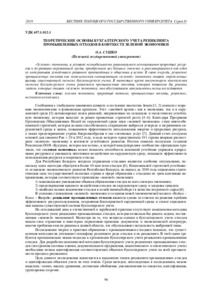Please use this identifier to cite or link to this item:
https://elib.psu.by/handle/123456789/24040Full metadata record
| DC Field | Value | Language |
|---|---|---|
| dc.contributor.author | Сушко, О. А. | - |
| dc.date.accessioned | 2019-12-04T08:59:36Z | - |
| dc.date.available | 2019-12-04T08:59:36Z | - |
| dc.date.issued | 2019 | - |
| dc.identifier.citation | Вестник Полоцкого государственного университета. Серия D, Экономические и юридические науки. - 2019. - № 5. – С. 96-103. | ru_RU |
| dc.identifier.issn | 2070-1632 | - |
| dc.identifier.uri | https://elib.psu.by/handle/123456789/24040 | - |
| dc.description | Theoretical Bases of Accounting of Industrial Waste Recycling in the Context of the Green Economy V. Sushko | ru_RU |
| dc.description.abstract | «Зеленая» экономика, в условиях нестабильности рационального использования природных ресурсов и деградации окружающей среды, приобретает все большее значение и рассматривается как один из императивов устойчивого развития производства и общества в целом. В свою очередь, рециклинг промышленных отходов как неотъемлемая составляющая «зеленой» экономики ставит определенные вызовы существующей системе бухгалтерского учета. В настоящее время отсутствует комплексная система бухгалтерского учета рециклинга промышленных отходов, которая позволила бы решать задачи, которые ставит «зеленая» экономика, что обусловливает актуальность темы исследования.= “Green” economy, in conditions of instability of natural resources’ rational use and environmental degradation, becomes increasingly important and is considered as one of the imperatives of sustainable development of production and society as a whole. Industrial waste recycling, in turn, as an integral component of “green” economy, poses certain challenges to the existing accounting system. Currently, there is no comprehensive accounting system for industrial waste recycling, which would allow solving the tasks posed by “green” economy, which makes the chosen research topic relevant. The purpose of this study is to identify the stages of industrial waste recycling and to identify accounting objects at these stages. Among the methods used in the study can distinguish synthesis, analysis, comparison, logical generalization, inference by analogy, classification, grouping and so on. | ru_RU |
| dc.language.iso | ru | ru_RU |
| dc.publisher | Полоцкий государственный университет | ru_RU |
| dc.relation.ispartof | Веснік Полацкага дзяржаўнага ўніверсітэта. Серыя D, Эканамічныя і юрыдычныя навукі | be_BE |
| dc.relation.ispartof | Herald of Polotsk State University. Series D, Economics and law sciences | en_EN |
| dc.relation.ispartof | Вестник Полоцкого государственного университета. Серия D, Экономические и юридические науки | ru_RU |
| dc.relation.ispartofseries | Серия D, Экономические и юридические науки;2019. - № 5 | - |
| dc.rights | open access | ru_RU |
| dc.subject | Государственный рубрикатор НТИ - ВИНИТИ::ОБЩЕСТВЕННЫЕ НАУКИ::Экономика и экономические науки | ru_RU |
| dc.subject | Зеленая экономика | ru_RU |
| dc.subject | Природный капитал | ru_RU |
| dc.subject | Промышленные отходы | ru_RU |
| dc.subject | Рециклинг | ru_RU |
| dc.subject | Технологический цикл | ru_RU |
| dc.subject | Green economy | ru_RU |
| dc.subject | Natural capital | ru_RU |
| dc.subject | Industrial waste | ru_RU |
| dc.subject | Recycling | ru_RU |
| dc.subject | Technological cycle | ru_RU |
| dc.title | Теоретические основы бухгалтерского учета рециклинга промышленных отходов в контексте зеленой экономики | ru_RU |
| dc.type | Article | ru_RU |
| dc.identifier.udc | 657.1.012.1 | - |
| Appears in Collections: | 2019, № 5 | |
Files in This Item:
| File | Description | Size | Format | |
|---|---|---|---|---|
| 96-103.pdf | 283.24 kB | Adobe PDF |  View/Open |
Items in DSpace are protected by copyright, with all rights reserved, unless otherwise indicated.